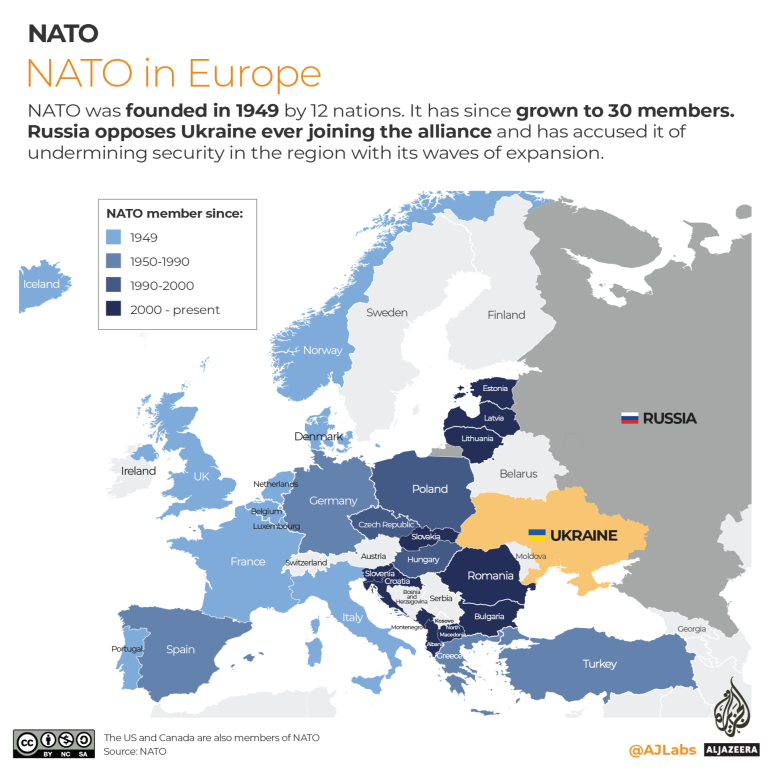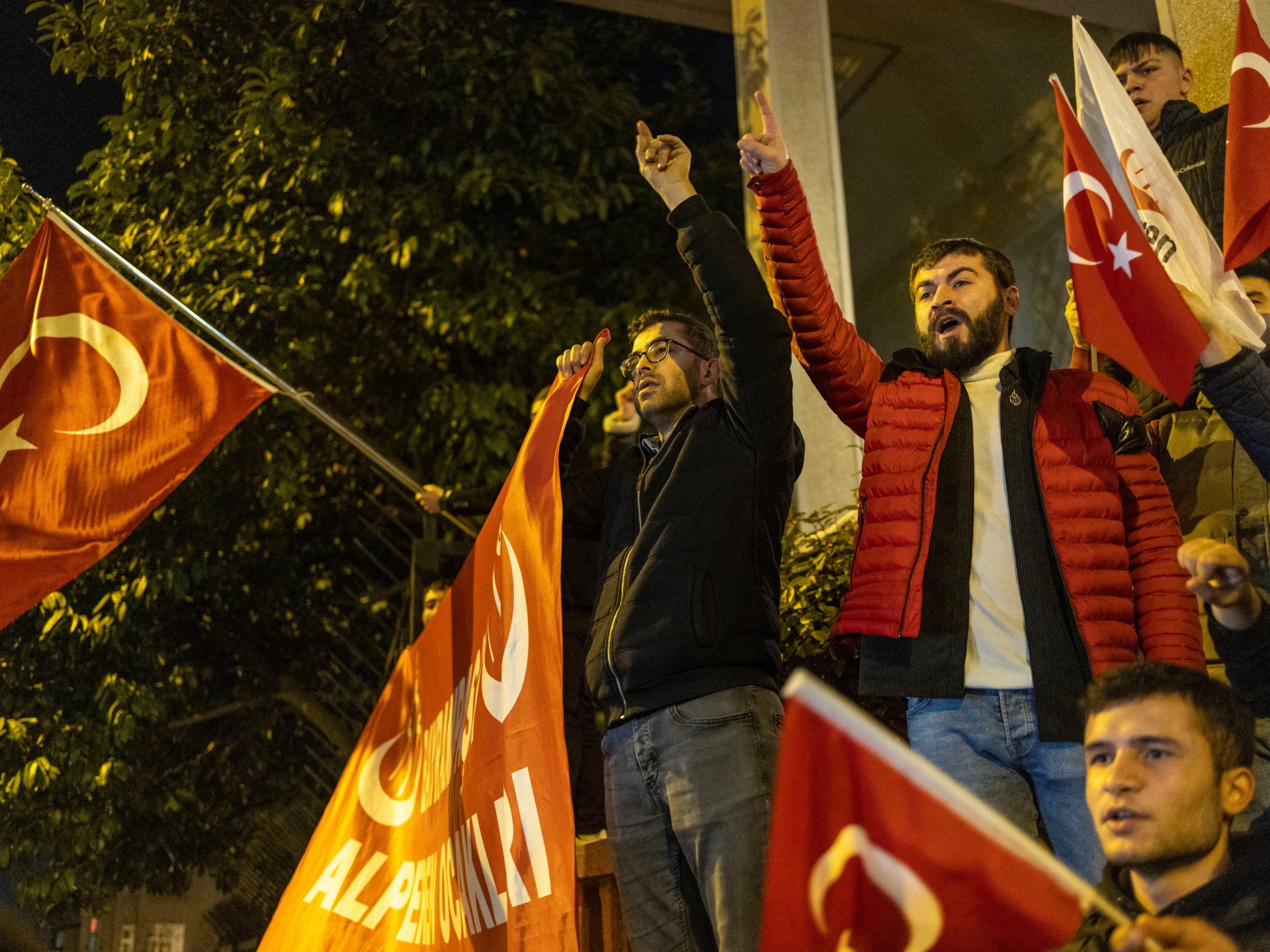Timeline of political relations between Sweden and Turkey
Sweden’s bid for NATO membership faces a dead end after a rally by the far right burns the Quran in front of Turkey’s embassy in Stockholm.
Sweden’s bid for NATO membership is up in the air amid strained ties with Turkey over Ankara’s demands to hand over Kurdish activists and prevent rallies attacking its leadership.
Tensions climaxed on Saturday when the leader of a Danish far-right political party burned the Quran while protesting in front of Turkey’s embassy in Stockholm.
Ahead of the rally, Ankara said it was cancelling a visit by Sweden’s defence minister aimed at overcoming Turkey’s objections to its NATO membership and Turkey’s foreign minister had called for the rally to be banned.
Sweden needs Turkey’s backing to gain entry to NATO as fears in Europe grow after Russia’s invasion of Ukraine.
Here is a look at recent relations between Turkey and Spain:
May 12, 2022
Finnish President Sauli Niinisto and Prime Minister Sanna Marin announced that Finland must apply to join the NATO military alliance “without delay”.
May 13, 2022
Turkey’s President Recep Tayyip Erdogan said it is not possible for Ankara to support Sweden and Finland joining the transatlantic military alliance, signalling a possible hurdle to the two countries’ plans to join the organisation.
May 15, 2022
The Finnish government officially announced its intention to join NATO. Sweden’s ruling party followed shortly after.

May 16, 2022
President Erdogan confirmed Turkey’s opposition to NATO membership for Finland and Sweden, shooting down a proposal by the Nordic countries to send delegations to Ankara to address the matter.
“We will not say ‘yes’ to those [countries] who apply sanctions to Turkey to join security organisation NATO,” Erdogan said at a news conference, referring to Sweden’s 2019 decision to suspend arms sales to Turkey over its military operation in neighbouring Syria.
Turkey also accused the two nations of harbouring “terror” groups, including the Kurdistan Workers’ Party (PKK), blacklisted by Ankara, the European Union and the United States.
Justice ministry sources told the state news agency Anadolu on Monday that Sweden and Finland had failed to respond positively to Turkey’s 33 extradition requests over the past five years.
May 18, 2022
Finland and Sweden officially applied to join the world’s biggest military alliance. The move requires the unanimous approval of the alliance’s 30 current members. The process was expected to take about two weeks.
June 28, 2022
Turkey lifted its veto over Finland and Sweden’s NATO bid after four hours of talks just before a NATO summit began in Madrid.
Turkey’s justice minister announced that as part of the deal, his country will seek the extradition of 33 alleged Kurdish fighters and coup plot suspects from Sweden and Finland.
December 19, 2022
Sweden’s Supreme Court blocked the extradition of an exiled Turkish journalist, a key demand by Ankara.
There were “several hindrances” to sending back former editor-in-chief of the Zaman daily, Bulent Kenes, whom Turkey accuses of being involved in a 2016 attempt to topple Erdogan, the court said.
December 22, 2022
Turkish foreign minister Mevlut Cavusoglu said Sweden is not even halfway through fulfilling the commitments it made to secure Ankara’s support for its membership.
He said a Swedish court’s decision not to extradite a man wanted by Turkey for alleged links to a failed 2016 coup had “poisoned” a positive atmosphere in negotiations.
January 8, 2023
Swedish Prime Minister Ulf Kristersson said Sweden cannot fulfil Turkey’s demands, but he is confident Ankara will approve its bid to join NATO.
January 12, 2023
Turkey summons Sweden’s ambassador to answer for a video posted by the pro-Kurd Rojava Committee of Sweden that depicted an Erdogan effigy swinging by his legs from a rope.
A tweet by the group on January 11 compared Erdogan to Italy’s Fascist dictator Benito Mussolini, who was hung upside down after his execution in the closing days of World War II.
January 21, 2023
Turkish officials denounced the permission granted to Rasmus Paludan, a right-wing Swedish-Danish politician, to stage a protest in front of its embassy in the Swedish capital.
After a diatribe of almost an hour in which he attacked Islam and immigration in Sweden, Paludan set fire to a copy of the Quran.
Swedish police gave their authorisation for the demonstration after determining it fell under the country’s liberal freedom of speech laws. But Turkish presidential spokesman Ibrahim Kalin said allowing the protest was “encouraging hate crimes and Islamophobia”.
Subsequently, a group of protesters set fire to a Swedish flag at a rally outside its consulate in Istanbul and called on Turkey to cut diplomatic ties with Stockholm.
A day after summoning the Swedish ambassador over Paludan’s latest demo, Ankara said it called off defence minister Pal Jonson’s visit scheduled for January 27, aimed at overcoming Turkey’s objections to Sweden’s NATO bid.




